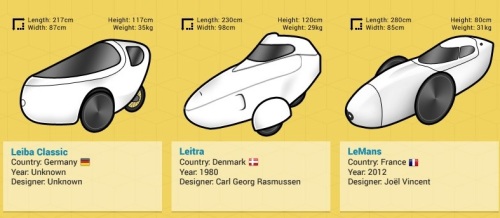 Mads Phikamphon from Denmark published an infographic depicting 27 velomobiles with their specifications and performance. It’s a handy overview for those who are considering to try one of these vehicles that blur the lines between cars and bicycles. The infographic was originally published at Cykelvalg. We leave the word to Mads:
Mads Phikamphon from Denmark published an infographic depicting 27 velomobiles with their specifications and performance. It’s a handy overview for those who are considering to try one of these vehicles that blur the lines between cars and bicycles. The infographic was originally published at Cykelvalg. We leave the word to Mads:
“Most people consider velomobiles as a rather new invention, but the first velomobiles were actually invented much earlier than most people think. In the 1930s you could buy a set of instructions to build your own “Fantom” – a velomobile for 2 persons made out of wood. Thousands of copies of the instructions were sold, but few bikes were built and soon the velomobiles were all but forgotten as cars got more and more popular. It wasn’t until the oil crisis in the 1970s that velomobiles again started to get some attention. A well recognized velomobile from that time is the “Leitra” that remains a popular model amongst many velomobile enthusiasts.”
“As you can see in the graphic below, there are now lots of models to choose between if you want a velomobile, although almost all of them share quite a few characteristics: 3 wheels, an aerodynamic body and room for just one person. Thanks to the aerodynamic body a velomobile is also the fastest HPV or Human Powered Vehicle around. In 2013 a “Velo X3” velomobile reached an amazing 134 km/h (83 mph) and many people expect the “Arion” velomobile to go even faster when it’s ready for testing in 2015. The only big problem that remains is that all the models are rather expensive. No velomobiles are being mass manufactured, so the price of a new velomobile remains at least $3000.”
Related articles:
- The velomobile: high-tech bike or low-tech car?
- Electric velomobiles: as fast and comfortable as automobiles, but 80 times more efficient
- Modular cargo cycles
- Cargo cyclists replace truck drivers on European city streets
- Pedal powered farms and factoriess: the forgotten future of the stationary bicycle
- Bike powered electricity generators are not sustainable
- Why bicycles are faster than cars





